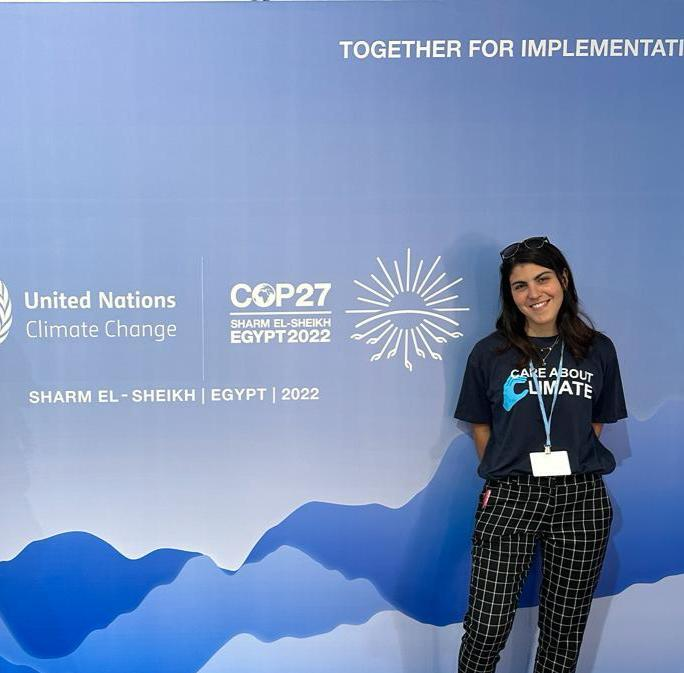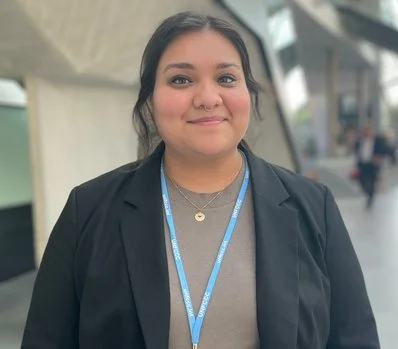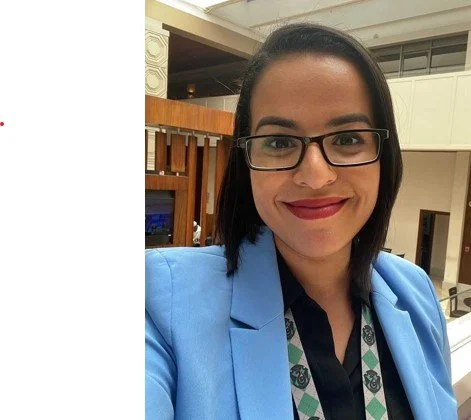Reflections on SB58 in Bonn, Germany
The Bonn Climate Change Conference, the 58th Sessions of the UNFCCC Subsidiary Bodies, took place two months ago. In this blog, we are sharing the insights and reflections of our amazing team of volunteers who attended and participated as youth delegates and represented CAC at the conference.
Julieta Marino Tartaglino (Argentina)
UNFCCC Task Force Manager
It feels as if the SB58 went by in a blur. After careful planning and organizing, we found ourselves in a whirlwind of meetings, plenaries and sessions in Bonn. Some of the most important issues I had the opportunity to follow were those of youth inclusion, conflict of interests by the UNFCCC and the COP Presidency and the logistical challenges that the people who need to attend these spaces the most continue to face.
Youth had a part to play in the SBs, yet, together with a great number of rejected visas and a lack of access to crucial spaces, it was clear we still have a long way to go to achieve meaningful participation. Conflict of Interest took over a lot of dialogue spaces, with a watchful eye on this year’s Presidency attendees urged both the Executive Secretary and the Conference Host to instate better transparency mechanisms, concluding on an announcement by the UNFCCC about a mandatory affiliation check-in from now forwards, certainly a small victory. Lastly, the logistical challenges amount to great financial barriers that many of the most affected cannot afford. Without their voices present, the Conferences cannot succeed.
Ruth Oviedo Hollands
(USA)
NDC Equity Project Program Manager
The atmosphere at the Bonn Climate Change conference was hopeful, but cautious. You could sense that civil society and Parties alike were trying their best to communicate needs and demands as we approached the end of the GST, the most prominent theme at the SBs this year. All the sessions I attended focused on the importance of providing ambitious climate action to mitigate the consequences of climate change. In the Plenaries we heard about what countries are demanding in order to survive the complexities the climate crises forces us to endure. From loss & damages to youth inclusion, advocates were desperate to let it be known that just because we are concluding the GST, the work is far from over
I focused on the Nationally Determined Contributions (NDCs) and their role in international climate action. As a major component of the GST, I valued the discussions held regarding youth and gender, human rights, and the role new technologies have in helping us understand what we can do better. One of the most impactful sessions for me was on how the SDGs rack up against the 2030 agenda based on NDCs submitted all around. Long story short, we are nowhere near where we should be to meet the 2030 SDG agenda and that's due to the lack of ambitious and inclusive NDCs. Climate and development challenges are becoming increasingly intertwined, but countries are failing to make progress on both the 2030 Agenda and the Paris Agreement. This session enforced what our NDC Equity tracker already tells us: We have to do better. Countries have to do better.
An unexpected, but appreciated theme at week one was technology and the role AI can have on potentially helping communities face climate disasters by identifying climate patterns and supporting risk assessment. This information can also support climate financing and data collection that can help understand weather patterns to validate climate action that makes a difference. I was delighted to see how much hope there is in these new tools, but at the same time couldn't help but wonder how as a global society we've come full circle with the role of technology in our everyday lives. Technology got us where we are and now they have the potential to support ambitious and effective climate action. I look forward to learning how this technology will address current and future issues to promote realistic and functional climate pledges.
Haddijatou Ceesay
(Gambia)
NDC Equity Project Volunteer
This has been my first time attending the SB’s, feeling very connected with youths and how active they had been till the very end of the conference. My expectations of the conference regarded meaningful inclusion of every stakeholder's participation in amplifying the importance of each role of intergenerational equity, for the conference to pave the way for a successful outcome of COP28 and strengthening the coordination mechanisms between youths and inclusive review of NDC recommendations for the global stocktake. The youth at SB58 demanded for an equitable and just transition away from fossil fuels and the protection of vulnerable communities affected by climate change.
I was passionate about meeting youths in demanding actions to come together with efforts to combat a common goal with a sustainable future for all. I had the opportunity to attend and contribute to the daily insights during the conference. This included the African Group daily coordination meeting for countries to agree on ways to reach the target of net zero by 2050, whilst mainstreaming the NDC’s and reframing policies and adaptation. I also attended the UNFCCC training on the Gender Action Plan, a presentation of equity versus equality and mainstreaming the gender system in national budgets, crucial with challenges including resource planning and allocations. I attended the work programme on just transition pathways negotiations, hoping to see solutions on the main issues where constructive discussions were made by parties. During the press conference of Care About Climate on the theme “Global Youth Climate Activists Rally”, we shared demands for UN Climate negotiations, the panelists buttress the importance of youth participation in negotiations and how they can also be part of decision making spaces, advocating for fair fossil fuel phaseout and loss and damage finance. Also following other sessions which fall at a crucial point during the road to COP each year was important.
However, progress on nearly all priority areas of negotiations was yet to be recorded and the SB58 agenda is yet to be formally adopted with uncertainties over several negotiation tracks, including Global Goal Adaptation (GGA), the just transition to sustainable societies, and the mitigation work programme and loss and damage, among others. Many unanswered questions remain about how to address non-economic losses and these perhaps require scientific studies to be led by the IPCC.
Dolores Bas
Fundraising Volunteer at CAC
The SB58 Conference provided me with an incredible experience, showcasing the vast opportunities for collective solidarity in addressing climate change. It was inspiring to witness the remarkable organization and growing influence of young people through climate action. Despite the challenges we encountered, such as logistical barriers, visa restrictions, and the limited economic means for young advocates, I was amazed by the unity and communication among youth-led organizations, as they relentlessly advocated for those who were marginalized because of this.
As a virtual participant, I had the privilege of observing the diverse positions taken by different countries. The unified voice of the Global South resonated powerfully during the technical dialogues related to the Global Stocktake. These countries emphasized the importance of a holistic approach that seeks for viable solutions for their regions, and the support from the Global North. They highlighted the importance of providing viable financial alternatives and reducing uncertainties surrounding them. Moreover, they stressed the significance of adaptation in addressing climate change, claiming that the choices made by the most powerful do not disproportionately burden the most vulnerable countries and frontline communities. However, it is disheartening to note that Northern countries did not exhibit a high level of commitment to these causes, something we must further demand at COP28.
Throughout the Conference, I found the debates surrounding food-related issues particularly engaging, which were led primarily by passionate young advocates through side events. Among these, the Storecard developed by the World Animal Protection stood out as an invaluable resource. It provided a comprehensive global analysis of the largest chicken and pork meat processing companies, ranking them based on their GHG emissions. Additionally, the “Stop Financing Factory Farm Campaign” led by numerous organizations called for an end to financial support from powerful entities such as multilateral banks and governments. They demonstrated that this approach is not only morally imperative but also economically advantageous, considering the benefits of nature-based solutions.
Another inspiring aspect of the conference was witnessing the efforts of small islands and communities. The Republic of Vanuatu served as an excellent example, undertaking multiple projects to enhance their agency in the international arena. They are actively engaging the International Court of Justice through an Advisory Opinion in which any country in the world can engage, and striving to establish ecocide as an international crime under the jurisdiction of the International Criminal Court. This could make individuals accountable for ecocidal practices if incorporated into the Rome Statute. It is truly remarkable to see how countries can find creative ways to combat climate change, irrespective of their available resources. These empowering examples, supported by various organizations and international cooperation, were abundant throughout the Conference.
I express my deepest gratitude to Care About Climate for facilitating my virtual participation in this Conference. We are starting to assertively occupy these spaces, gradually gaining agency year after year. We are demonstrating that we can actually make a difference, and it is essential to continue fostering global connections to amplify our collective demands.
Ana Carolina de Carvalho Siqueira
(Brazil)
UFCCC Task Force Volunteer
The 58th SB was my first UN conference. The opportunity to join it virtually was simultaneously an honor, a privilege and a responsibility, considering the challenges that youth, especially those from the Global South, face regarding visa, funding and access to a badge itself to participate and be heard. Hence, being able to share the highlights of this moment with youth all over the world through the “SB From Home” was a special moment, in an attempt to democratize our presence and the discussions that take place in these spaces.
At the 58th SB, there were many subjects related to the complex problem that is the climate crisis. Here, I try to highlight a few that I was most interested in. Being from Brazil, I was particularly moved by the discussions about the points of view from developing countries, especially about the climate finance topic. It was great to see so many diverse voices asking to decolonize climate concepts such as economy, development and just transition, taking in consideration the reality and knowledgment of the Global South, and the role of local governance at the recognition and allocation of finance according to their own communities needs and ways of solutions. Finance is an urgent and current necessity in the Global South and time is a precious concept when we talk about climate change.
The Global Stocktake (GST) was also an important topic discussed in a variety of events during these two weeks. Starting from the point that climate change needs an holistic approach, the intergenerational human rights perspective on the GST was a demand. It stressed the need for democratic participation and the inclusion of vulnerable groups. At a press conference with representatives of indigenous people from Brazil, it was powerful to listen about the amazing contributions they make to keep the forests up and alive, and the efforts they do to mitigate the consequences of the climate crisis. For these and many more reasons, the consideration of indigenous rights under the GST was advocated, highlighting the importance of protecting its territories, culture and knowledge.
The fossil fuel crisis was another emphasized matter, regarding the need for a fossil fuel phase out. The participation of the fossil fuel industry at the climate agenda was questioned, arguing that it is a clear conflict advocating that the public interest and human rights must be at the center of the climate change agenda, not the profit, at a risk of disrupting the negotiations.
I am happy to be a part of Care About Climate and thankful for this meaningful opportunity. The power of a diverse youth lead community is to encourage, empower and facilitate young advocates to take their roles as an important part of tackling the climate crisis. The SB is an example of a conference that provides youth a massive learning experience, but it is also our space to showcase our concerns and ideas, especially considering that youth and the next generations already are and will continue to face the burdens of the climate impacts. The climate agenda must be intergenerational.
Tina Taylor-Harry (Nigeria)
Volunteer at CAC
Attending the Bonn Climate Change Conference, where I followed discussions on just transitioning from fossil fuel to renewable energy, loss and damage and finance, was a unique opportunity for me. SB58 is a preparatory ground for COP28 in the fight against climate change. There is still a lot that needs to be done before COP28. Almost all the of agenda was adopted except mitigation. The International Court of Justices (ICJ) was included in the climate change discussion, which is historical. The general secretary has made a request to the international court of justice through a resolution adopted by all parties by consensus for an adversary option on legal obligations related to climate change.
Currently, there are documented records of elevated sea surface temperatures and air temperatures, as well as notably low levels of sea ice on a global scale. The increase in emissions is resulting in unprecedented and unforeseen effects on our present climate. It is also widely acknowledged that the current industrial sector, which relies heavily on fossil fuels, is unsustainable. Consequently, the Fossil Fuel Non-Proliferation Treaty proposes a clear solution to curb the expansion of fossil fuels and facilitates a fair and equitable transition to sustainable energy sources. A comprehensive strategy is necessary to effectively combat the climate crisis and leave no avenue unexplored.
During the Bonn Climate Change Conference, I concluded that what global climate justice needs from these negotiations is the following:
Urgency given to loss and damage and funding. More climate financing for developing countries for them to be able to put in place mitigation efforts and create processes for adaptation measures such as NAPs (National Adaptation Plans).
Loss and damage fundings must be operationalized as soon as possible and it must be ensured that these reach the most vulnerable groups.
The just transition work programme needs to consider the needs of developing countries, as well as push developing countries in the direction of phasing out fossil fuels and switching to renewable energy and resources.
Funding must be grant and gift based instead of loan based.
The transparency of the framework should be enhanced.
Finance must have multiple agenda points.
A conclusion on global stocktake must be agreed on and structured.
Lastly, at SB58 many youths were present, which is an important improvement. However, we need them at the negotiation table as well, not just as observers. Youths are not engaging as fully as they should because so many youths got their visa denied and could not attend. Moreover, the financial burden should be taken off youths and these conferences should be made more accessible. Government funding should be made available alongside contributions from non-governmental organizations. For future conferences, consulates need to ensure that visas are readily available and affordable housing options are provided for all attendees.
The necessity for immediate action cannot be overstated, given the high-stakes urgency of the current climate situation. The voices of youths and activists that advocate for change in regard to the environment need to be heard. Giving up is not a solution, as the Pacific youth say: “We are not drowning, we are fighting”.
Gabriela Taveras
Volunteer at CAC
When people ask how I got into climate change, my answer is: “avocados”. In 2020, I conducted field research for my masters thesis about the socioeconomic impact of avocado harvesting in the southwest of the Dominican Republic. Since then, I’ve been captivated by the world of agroecology and climate smart agriculture, having devoured books such as Vandana Shiva’s “Who really feeds the world?” and completed a graduate certificate on the conservation, restoration and sustainable use of tropical forest landscapes.
Needless to say, when I saw the 58th SBs would have multiple side events and meetings focused on the aforementioned topics, I was excited to learn I could follow them virtually, especially given how much information I ended up digesting across four meetings. For example, prior to a side event on the protection gap faced by developing countries, I was unfamiliar with the V20, or the Vulnerable Group of 20, a group of 58 nations with a combined population of 1.5 billion, a 5% share of global emissions, and a collective GDP of USD 2.4 trillion. According to their “Climate Vulnerable Economies Loss Report”, climate change eliminated 20% of their wealth over the last 20 years.
Rwanda’s Ministry of Agriculture and Animal Resources followed this theme closely through its side event titled: “The Economics of Harmonised National Action Agendas for Land Restoration and Food Security”. One of the presentation’s key takeaways was that, in the last two decades, they’ve seen a major expansion in the proportion of land being used for agroforestry systems, which underscored hope in the context of another side event, hosted by the Food Policy Forum for Change, the Agroecology Coalition and Biovision, titled: “Evidence of the Benefits of Agroecology to Deliver on the Targets of the Rio Conventions”.
Working with nature, and not against it, to feed the world, is crucial when we consider that food systems are responsible for 27% of global GHGs and 52% of land devoted to traditional agriculture is degraded. As one the presenters pointedly remarked: “Food days in COPs are important steps to recognise the importance of this topic.” And I couldn’t agree more; there can be no climate justice without food sovereignty. Given that there is a 2017 decision addressing this matter, titled the “Koronivia Joint Work on Agriculture”, we must continue to bridge the gap between climate action and food security, while enshrining agroecology in other UNFCCC mechanisms beyond the Convention on Biological Diversity.
By promoting agroecology, we can support soil health and, by extension, transform it into a carbon sink. In the next 30 years, feeding a global population of almost 10 billion will require a radical transformation in how food is produced, processed, traded, and consumed, requiring innovative partnerships and a holistic approach towards transformative and integrated food and climate action. I am curious to see how the conversation on climate smart agriculture and food sovereignty continues at COP28, and I’m grateful to Care About Climate for letting me follow my first SBs from home!







